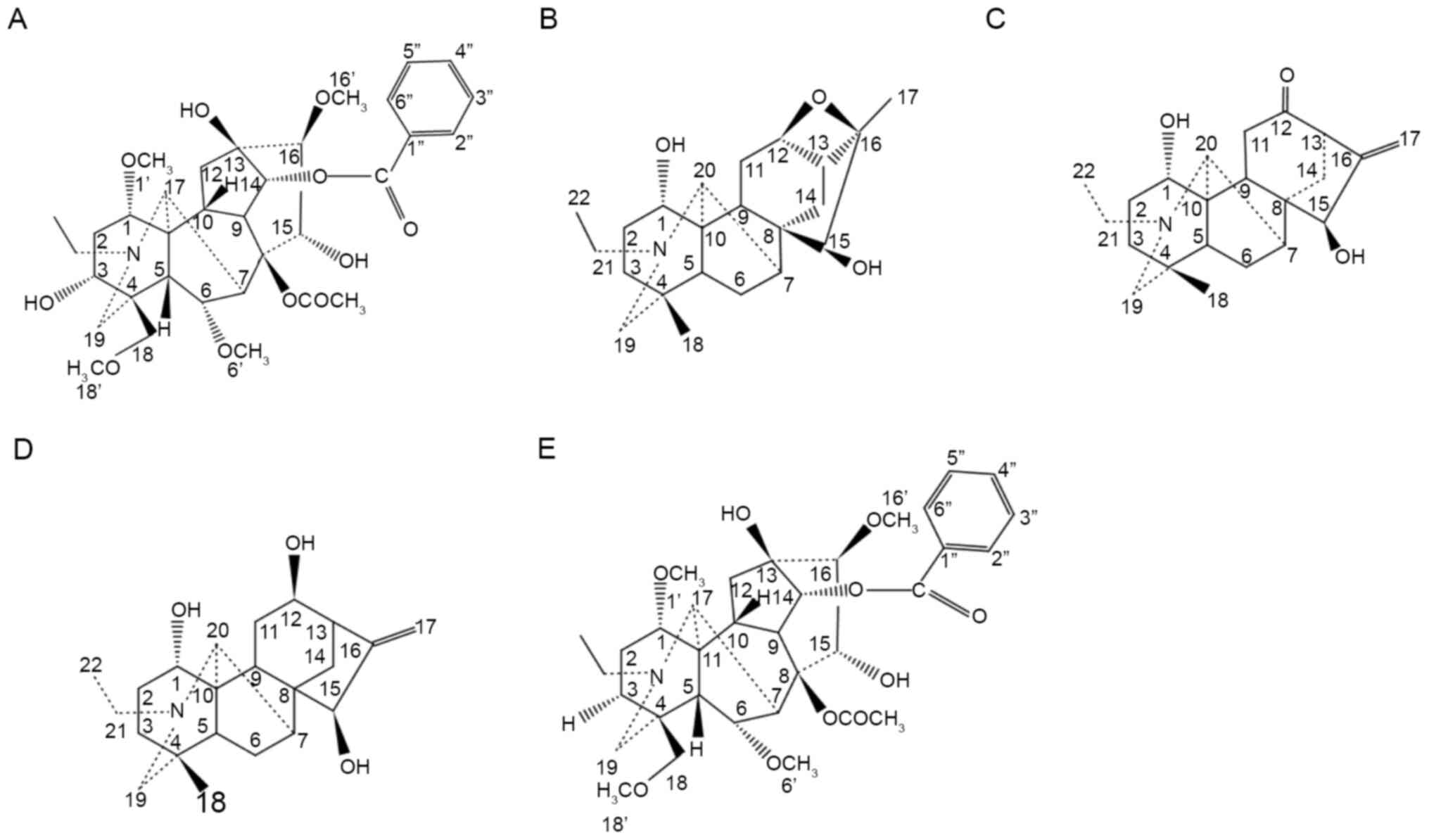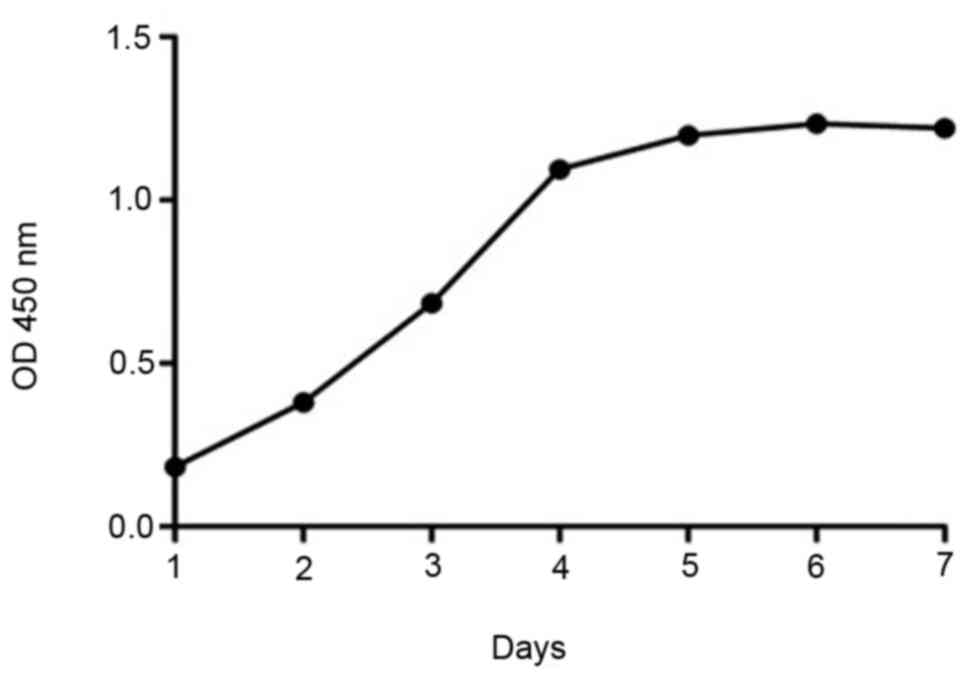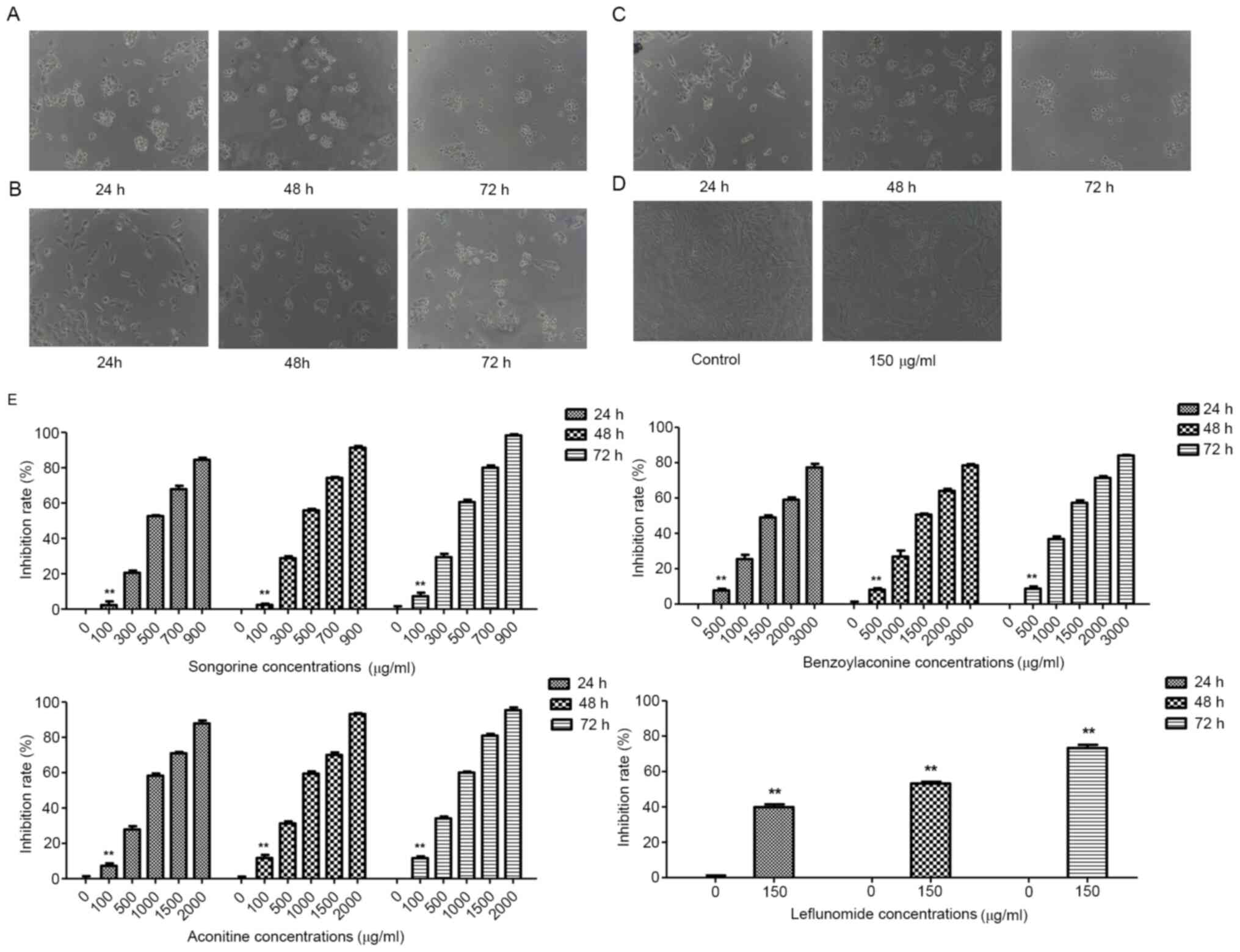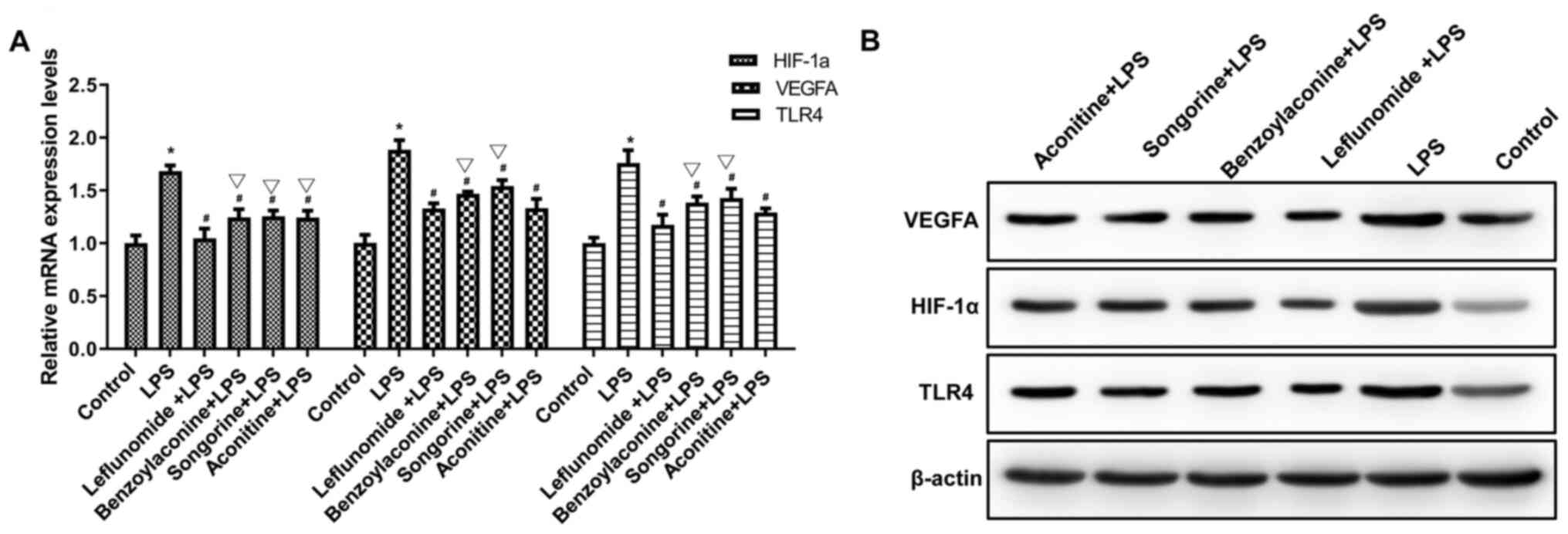|
1
|
Hao DC, Ge GB, Xiao PG, Wang P and Yang L:
Drug metabolism and pharmacokinetic diversity of ranunculaceae
medicinal compounds. Curr Drug Metab. 16:294–321. 2015.PubMed/NCBI View Article : Google Scholar
|
|
2
|
Hao DC, Xiao PG, Ma HY, Peng Y and He CN:
Mining chemodiversity from biodiversity: Pharmacophylogeny of
medicinal plants of Ranunculaceae. Chin J Nat Med. 13:507–520.
2015.PubMed/NCBI View Article : Google Scholar
|
|
3
|
Wu M and Wei Y: Ethnobotany of Aconitum in
Xinjiang. Chin Wild Plant Resources. 23:29–30. 2004.(In
Chinese).
|
|
4
|
Mei H, Zhao F, Juan LI, Jun LU and Nie J:
The study on acute toxicity of Xinjiang aconitum leucostomum
worosch and its processed products. J Xinjiang Med Univ. 7:918–921.
2013.(In Chinese).
|
|
5
|
Malik J, Tauchen J, Landa P, Kutil Z,
Marsik P, Kloucek P, Havlik J and Kokoska L: In vitro
antiinflammatory and antioxidant potential of root extracts from
Ranunculaceae species. S Afr J Bot. 109:128–137. 2017.
|
|
6
|
Wu JJ, Zhu YF, Guo ZZ, Lou YM, He SG, Guan
Y, Zhu LJ, Liu ZQ, Lu LL and Liu L: Aconitum alkaloids, the major
components of Aconitum species, affect expression of multidrug
resistance-associated protein 2 and breast cancer resistance
protein by activating the Nrf2-mediated signalling pathway.
Phytomedicine. 44:87–97. 2018.PubMed/NCBI View Article : Google Scholar
|
|
7
|
Li J, Xu GQ and Zhao FC: Resources surveys
of aconitum plants in Cinjiang province(II). Lishizhen Med Materia
Med Res. 12:2888–2889. 2011.(In Chinese).
|
|
8
|
Liu SM, Nie JH, Pan R and Zhao FC:
Determination of the content of total alkaloid in Xinjiang genus
Aconitum. J Xinjiang Med Univ. 2:193–196. 2012.
|
|
9
|
Khader SZA, Ahmed SSZ, Arunachalam T,
Nayaka S, Balasubramanian SK, SyedAmeen ST and Ponnusamy P: Radical
scavenging potential, antiinflammatory and antiarthritic activity
of isolated isomer Methyl-γ-Orsellinate and roccellatol from
Roccella montagnei Bel. Bulletin Faculty Pharmacy Cairo Uni.
56:39–45. 2018.
|
|
10
|
Lü S, Wang Q, Li G, Sun S, Guo Y and Kuang
H: The treatment of rheumatoid arthritis using Chinese medicinal
plants: From pharmacology to potential molecular mechanisms. J
Ethnopharmacol. 176:177–206. 2015.PubMed/NCBI View Article : Google Scholar
|
|
11
|
Jiang T, Xuan YH, Fu L, et al: Content
changes of four alkaloids in the aconite of Junggar in the
processing process. Chin Traditional Med. 38:2641–2646. 2016.
|
|
12
|
Siyi M, Lin YY, Zhang J and Zhao YC:
Screening of anti-EGFR active ingredients in Aconite from Junggar,
Xinjiang based on cell membrane chromatography. Chin Pharmacist.
21:766–771. 2018.
|
|
13
|
Wang F, Zhao J, Zhao F and Nie J: Study on
the chemical constituents of diphtheria aconite. China Pharmacy.
9:1233–1235. 2015.
|
|
14
|
Zhong Y and Shu R: TLC identification of
flavonoids and alkaloids from Chinese medicinal herbs. Chinese Folk
Medicine. 17:9–11. 2017.
|
|
15
|
Liao SG, Li YT, Zhang LJ, Wang Z, Chen TX,
Huang Y, Li J, Wang AM, Li YJ, Lan YY and Wang YL:
UPLC-PDA-ESI-MS/MS analysis of compounds extracted by cardiac h9c2
cell from Polygonum orientale. Phytochem Anal. 24:25–35.
2013.PubMed/NCBI View
Article : Google Scholar
|
|
16
|
Djabrouhou N and Guermouche MH:
Development of a stability-indicating HPLC method of etifoxine with
characterization of degradation products by LC-MS/TOF, 1H and 13C
NMR. J Pharm Biomed Anal. 100:11–20. 2014.PubMed/NCBI View Article : Google Scholar
|
|
17
|
Ma JD, Jing J, Wang JW, Yan T, Li QH, Mo
YQ, Zheng DH, Gao JL, Nguyen KA and Dai L: A novel function of
artesunate on inhibiting migration and invasion of fibroblast-like
synoviocytes from rheumatoid arthritis patients. Arthritis Res
Ther. 21(153)2019.PubMed/NCBI View Article : Google Scholar
|
|
18
|
Wen X, Chen X, Liang X, Zhao H, Li Y, Sun
X and Lu J: The small molecule NSM00191 specifically represses the
TNF-α/NF-κB axis in foot and ankle rheumatoid arthritis. Int J Biol
Sci. 14:1732–1744. 2018.PubMed/NCBI View Article : Google Scholar
|
|
19
|
Matsumoto Y, Ichihara H, Hino M,
Umebayashi M and Ueoka R: Therapeutic effects of hybrid liposomes
without drugs for rheumatoid arthritis. Drug Deliv. 22:619–626.
2015.PubMed/NCBI View Article : Google Scholar
|
|
20
|
Zhou L, Li L, Wang Y, Gao Q and Geng YQ:
Effects of RANKL on the proliferation and apoptosis of
fibroblast-like synoviocytes in rheumatoid arthritis through
regulating the NF-κB signaling pathway. Eur Rev Med Pharmacol Sci.
23:9215–9221. 2019.PubMed/NCBI View Article : Google Scholar
|
|
21
|
Livak KJ and Schmittgen TD: Analysis of
relative gene expression data using real-time quantitative PCR and
the 2(-Delta Delta C(T)) method. Methods. 25:402–408.
2001.PubMed/NCBI View Article : Google Scholar
|
|
22
|
Li ZB, Lv GH and Chen DL: A study on the
chemical constituents of alkaloids in radix aconiti agrestis. Nat
Product Res. 19:9–14. 1997.
|
|
23
|
Xie H, Wei X and Wei B: Studies on the
alkaloid constituents from Aconitum karakolicum Rap. J00A0Tropical
Subtropical Botany. 5:57–59. 1997.
|
|
24
|
Zhang F, Peng SL, Liao X, Yu KB and Ding
LS: Three new diterpene alkaloids from the roots of Aconitum
nagarum var. lasiandrum. Planta Med. 71:1073–1076. 2005.PubMed/NCBI View Article : Google Scholar
|
|
25
|
Fuente GDL, Reina M, Valencia E and
Rodríguez-Ojeda A: The diterpenoid alkaloids from Aconitum
napellus. Heterocycles. 27:1109–1113. 1988.
|
|
26
|
Rao CL and Peng C: Study on the effect of
aconitic alkaloid on RAS gene expression and its molecular
mechanism of antitumor activity. Modern Preventive Med.
37:1098–1100, 1103. 2010.
|
|
27
|
Zhao XY, Wang Y, Li Y, Chen XQ, Yang HH,
Yue JM and Hu GY: Songorine, a diterpenoid alkaloid of the genus
Aconitum, is a novel GABA(A) receptor antagonist in rat brain.
Neurosci Lett. 337:33–36. 2003.PubMed/NCBI View Article : Google Scholar
|
|
28
|
Yang X, Wan L, He X and Song G: Inhibits
acetylcholinesterase activity. Anh Agricultural Sci.
36(3499)2008.
|
|
29
|
Li R, Feng F and Liu J: Research progress
on structure-activity relationship of C20 diterpenoid alkaloids.
Strait Pharmaceutical J. 25:1–4. 2013.
|
|
30
|
National Pharmacopoeia Commission.
Pharmacopoeia of the People's Republic of China, Part One. Beijing:
China Medical Science and Technology Press, 39, 2015.
|
|
31
|
Polishchuk P: Interpretation of
quantitative structure-activity relationship models: Past, present,
and future. J Chem Inf Model. 57:2618–2639. 2017.PubMed/NCBI View Article : Google Scholar
|


















